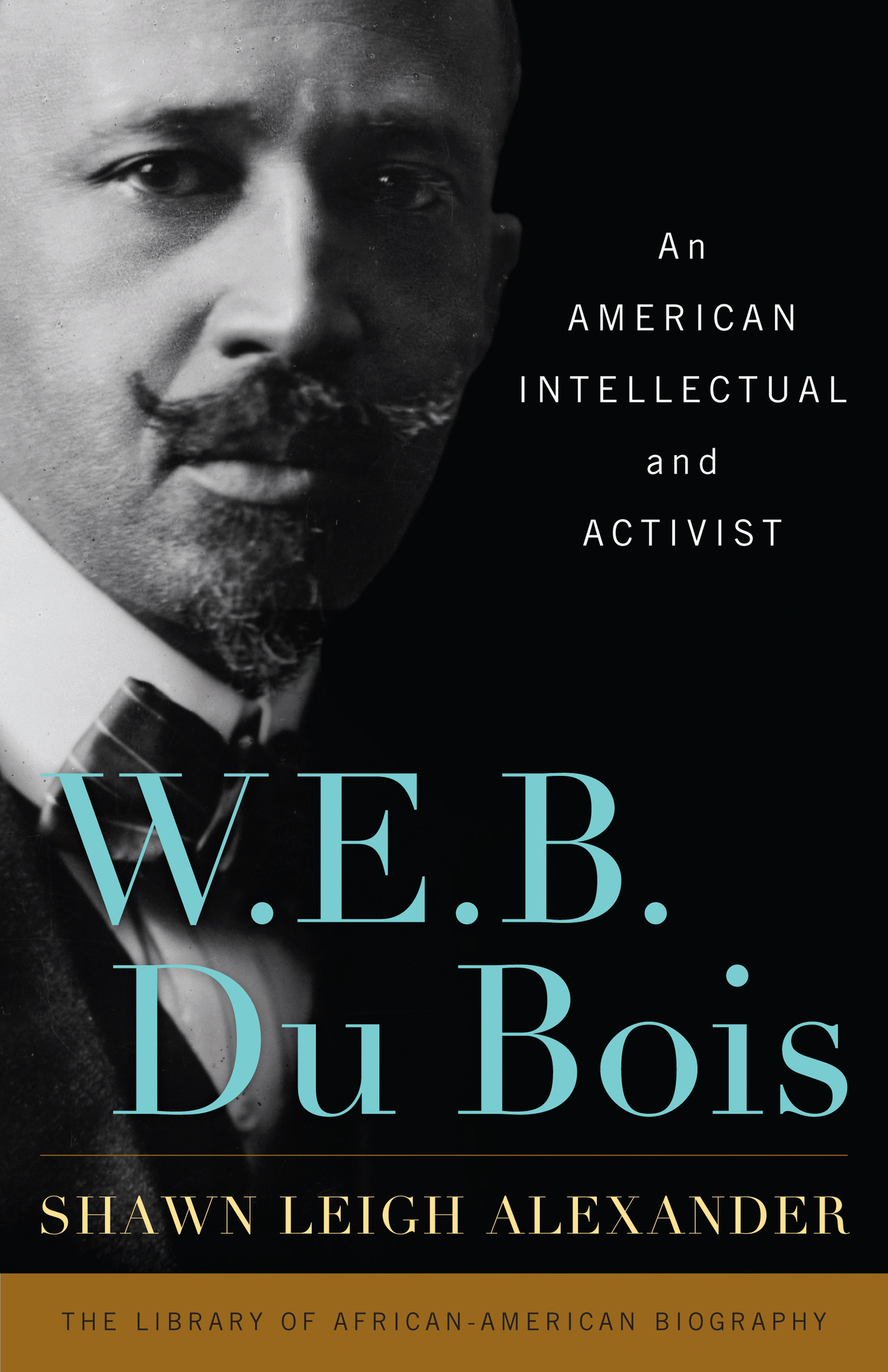W. E. B. Du Bois
The Library of African American Biography
General Editor: John David Smith
Charles H. Stone Distinguished Professor of American History
University of North Carolina at Charlotte
The Library of African American Biography aims to provide concise, readable, and up-to-date lives of leading black figures in American history, in widely varying fields of accomplishment. The books are written by accomplished scholars and writers, and reflect the most recent historical research and critical interpretation. Illustrated with photographs, they are designed for general informed readers as well as for students.
Titles in the Series
W. E. B. Du Bois: An American Intellectual and Activist, by Shawn Leigh Alexander (2015)
Paul Robeson: A Life of Activism and Art, by Lindsey R. Swindall (2013)
Ella Baker: Community Organizer of the Civil Rights Movement, by J. Todd Moye (2013)
Booker T. Washington: Black Leadership in the Age of Jim Crow, by Raymond W. Smock (2010)
Walter White: The Dilemma of Black Identity in America, by Thomas Dyja (2010)
Richard Wright: From Black Boy to World Citizen, by Jennifer Jensen Wallach (2010)
Louis Armstrong: The Soundtrack of the American Experience, by David Stricklin (2010)
W. E. B. Du Bois
An American Intellectual and Activist
Shawn Leigh Alexander
ROWMAN & LITTLEFIELD
Lanham Boulder New York London
Published by Rowman & Littlefield
A wholly owned subsidiary of The Rowman & Littlefield Publishing Group, Inc.
4501 Forbes Boulevard, Suite 200, Lanham, Maryland 20706
www.rowman.com
Unit A, Whitacre Mews, 26-34 Stannary Street, London SE11 4AB
Copyright 2015 by Rowman & Littlefield
All rights reserved. No part of this book may be reproduced in any form or by any electronic or mechanical means, including information storage and retrieval systems, without written permission from the publisher, except by a reviewer who may quote passages in a review.
British Library Cataloguing in Publication Information Available
Library of Congress Cataloging-in-Publication Data Available
Alexander, Shawn Leigh.
W. E. B. Du Bois : an American intellectual and actvist / by Shawn Leigh Alexander.
p. cm.
Includes bibliographical references and index.
ISBN 978-1-4422-0740-0 (cloth : alk. paper) -- ISBN 978-1-4422-0742-4 (electronic)
 TM The paper used in this publication meets the minimum requirements of American National Standard for Information Sciences Permanence of Paper for Printed Library Materials, ANSI/NISO Z39.48-1992.
TM The paper used in this publication meets the minimum requirements of American National Standard for Information Sciences Permanence of Paper for Printed Library Materials, ANSI/NISO Z39.48-1992.
Printed in the United States of America
Preface
In the folds of this European civilization I was born and shall die, imprisoned, conditioned, depressed, exalted and inspired. Integrally a part of it and yet, much more significant, one of its rejected parts.... Crucified on the vast wheel of time, I flew round and round the Zeitgeist, waving my pen and lifting faint voices to explain, expound and exhort; to see, foresee and prophesy, to the few who would listen.
W. E. B. Du Bois, 1940
To tackle a short, accessible biography of William Edward Burghardt Du Bois fifty years after his death is a daunting endeavor. Despite his ineradicable presence in American and international history, and numerous academic pages written about his activism and intellectual brilliance, the vast majority of Americans still have little knowledge of the man, his thought, or his actions. W. E. B. Du Bois: An American Intellectual and Activist is a primer into the world and writings of W. E. B. Du Bois. He was an extraordinay author who published twenty books of poetry, literature, and social, historical, economic, and political inquiry, the majority of which appeared in the final third of his life. In addition, he gave countless addresses, wrote hundreds of newspaper columns, edited a number of academic and popular journals, and helped form and actively participated in many civil rights organizations. Since his death in 1963, there have been more than forty primary source anthologies of his work, the majority published after his vast manuscript collection was donated to the University of Massachusetts-Amherst and made available to the public. Further, more than twenty scholarly anthologies have been published on Du Bois and the significance of his life and work. Finally, since the publication of Francis Broderick's W. E. B. Du Bois, Negro Leader in a Time of Crisis (1959), there has been more than twenty scholarly biographies written on Du Bois and his intellectual thought.
With all of these pages written by and about Du Bois it is easy to understand that he is one of the greatest intellectuals and activists to write, speak, teach, and lecture in America. As Meyer Weinberg declared, If the intellectual is a tensor between scholarship and social action, Du Bois fulfilled the role with the highest distinction. Moreover, Du Bois was a global citizen. He was always a scholar and activist that thought beyond the borders of the United States, recognizing the international aspects of color and class in the struggles of the darker peoples of the world. In 1953, when he was asked whether he still subscribed to the prophetic idea he professed in 1903 that the problem of the twentieth century is the problem of the color line, Du Bois wrote:
I still think today as yesterday that the color line is a great problem of this century. But today I see more clearly than yesterday that back of the problem of race and color, lies a greater problem which both obscures and implements it; and that is the fact that so many civilized persons are willing to live in comfort even if the price of this is poverty, ignorance and disease of the majority of their fellow men; that to maintain this privilege men have waged war until today war tends to become universal and continuous, and the excuse for this war continues largely to be color and race.
Du Bois was born in Great Barrington, Massachusetts, in 1868 and died in Ghana in 1963. He studied at Fisk University and the University of Berlin and was the first black Ph.D. from Harvard (1895). With the influence of his graduate studies in Germany, Du Bois was one of the founders of sociology, publishing the still-significant sociological treatise The Philadelphia Negro in 1899. He helped establish the now-over-a-century-old civil rights organization the National Association for the Advancement of Colored People (NAACP). From 1910 to 1934 he served as director of publicity and research for the organization, as well as editor of its important journal, The Crisis. After a split and absence from the leadership of the group Du Bois returned as the director of special research from 1944 to 1948. During these two phases with the NAACP, in addition to his editorial duties, he was a leader, in voice and action, in the fight against racial discrimination and violence, as well as world conflict.
Du Bois was also an influential architect of the Harlem Renaissance in his role with The Crisis and as an active participatory writer of both fiction and nonfiction works during the period. Additionally, he was a world leader of Pan-Africanism, serving in 1900 as secretary of the first Pan-African Conference. He was also a leading participant in the Pan-African Congresses of 1919, 1921, 1923, and 1945. His interest in the plight of Africans throughout the world led him to be a pioneer in the study of Africa and the Diaspora and ultimately the conception of the

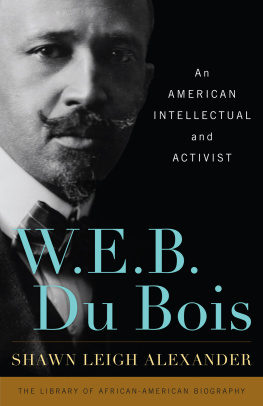


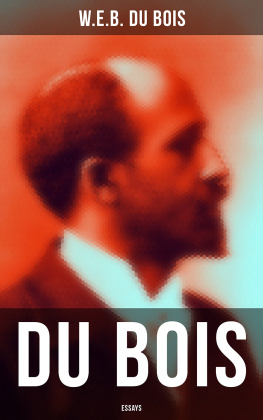
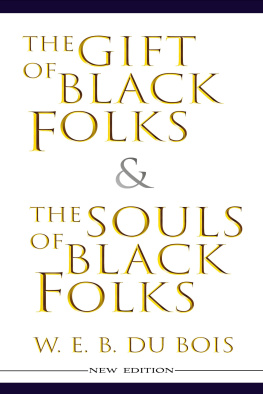


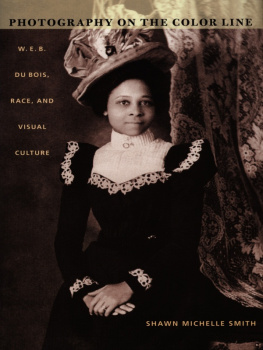
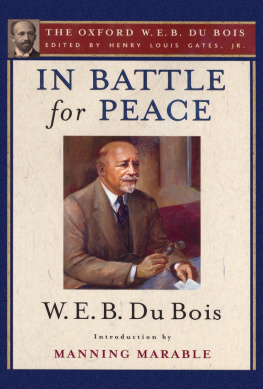
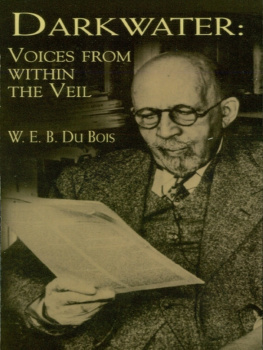
 TM The paper used in this publication meets the minimum requirements of American National Standard for Information Sciences Permanence of Paper for Printed Library Materials, ANSI/NISO Z39.48-1992.
TM The paper used in this publication meets the minimum requirements of American National Standard for Information Sciences Permanence of Paper for Printed Library Materials, ANSI/NISO Z39.48-1992.